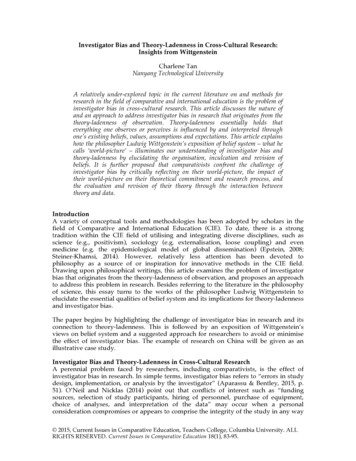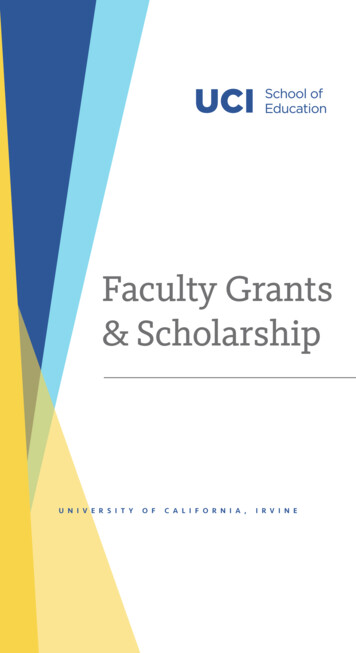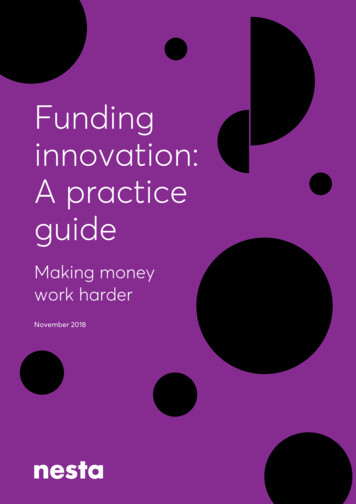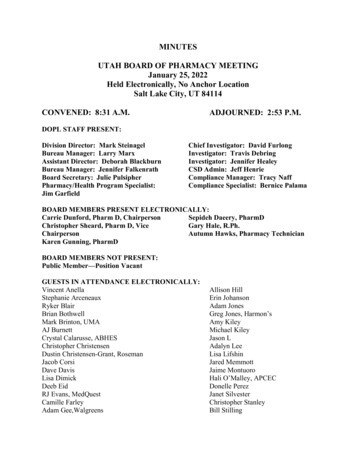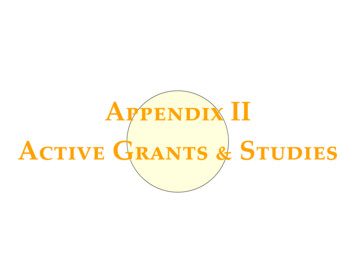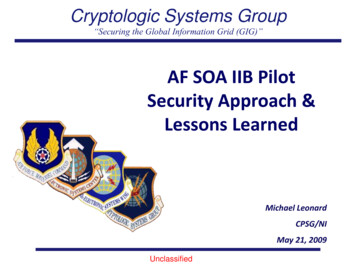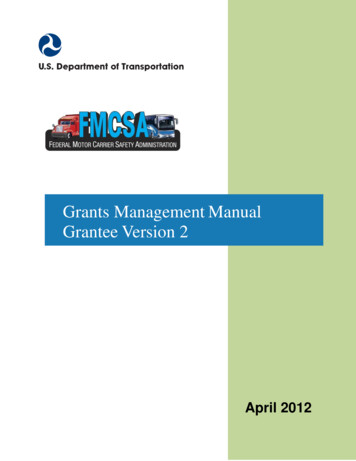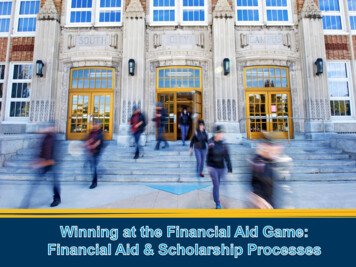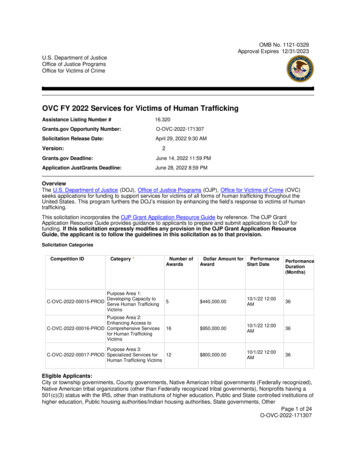
Transcription
Because breast cancer is everywhere, so are we.At Susan G. Komen for the Cure , we are committed to ENDING breast cancer forever byENERGIZING SCIENCE to find the cures and ensuring QUALITY CARE for all people, everywhere.INVESTIGATOR-INiTIATEDResearch Grants2009 -2 01 0 re q u est for ap p lications
Komen RESEARCH ProgramKomen’s Research Program plays a critical role in energizing science to find the cures by funding discoveries,individuals, and the resources essential to ending breast cancer. This program supports research and trainingsthrough many different types of grants and awards, each designed to meet specific objectives and to optimizeresults. The 2009-2010 Research Programs and portfolio of Requests for Applications (RFA) continues Komen’sstrategic focus on reducing breast cancer incidence and/or mortality. This RFA provides specific details about theInvestigator-Initiated Research (IIR) grants and what investigators need to know to apply for a grant under thisprogram.INVESTIGATOR-INITIATED Research GrantsIIR Grants seek to stimulate exploration of important issues and novel approaches that will lead to reductions inbreast cancer incidence and/or mortality within the next decade.Key DatesRFA ReleasedApril 30, 2009Pre-Application DueJune 1, 2009, by 8 p.m., e.t.Full Application DueJuly 31, 2009, by 8 p.m., e.t.Application ReviewSeptember 15, 2009 to November 6, 2009Award NotificationJanuary 2010Anticipated Funding StartFebruary 2010Annual Research FocusAll proposed research must have significant potential to lead to reductions in breast cancer incidence and/ormortality within the next decade. Research of interest in this funding year must be in one of these focus areas:breast cancer biology; genetics; molecular/genetic epidemiology; prevention; detection; risk assessment;biomarkers of risk, disease burden, and/or treatment response or resistance; novel therapeutics; lifestyleinterventions with the potential to affect disease outcomes (e.g., incidence and/or mortality); and novelapproaches that enhance understanding of the breast cancer disease process. Other important research issuessuch as symptom management, quality of life, end of life care, psychosocial aspects of breast cancer, and basicresearch without a disease endpoint such as incidence and/or mortality will not be considered for researchfunding this year, but may be the focus of other Requests for Applications issued at another time.Special Interest in Disparities ResearchResearch applications relevant to disparities in breast cancer outcomes across population groups will be givenspecial consideration. All research must have significant potential to lead to reductions in disparities in breastcancer incidence and/or mortality within the decade. Of particular interest are studies of the biologicdeterminants of disparities in breast cancer outcomes; models of clinical care that address the causes ofdisparities in care and outcomes across population groups; and public health interventions that specificallyaddress the provision of health care services in community settings and associated factors in breast cancer careand outcomes.All pre-applications will be evaluated to assess whether the proposed research is responsive to the specificobjectives and research focus of this year’s IIR RFA.Investigator-Initiated Research Grants, 2009-2010 Request for ApplicationsIPage 2 of 18
EligibilityApplicants and institutions must conform to the following eligibility criteria to be considered for funding underthe IIR program. Eligibility requirements must be met by the time of full application submission.Applicants M ust have a doctoral degree, including MD, PhD, DrPH, DO, or equivalent M ust not simultaneously apply for a Komen Career Catalyst Research award or be the Principal Investigator (PI)on a Career Catalyst grant currently in the first or second year of funding M ust ensure that all past and current Komen-funded grants or awards are up to date and in compliance with allKomen requirements; e.g., progress report submissions, IRB approvals, etc. A re not required to be U.S. citizens or residentsInstitutions M ust be a nonprofit institution or organization in the United States or abroad M ust agree with Komen’s Policies and Procedures for Research and Training Grants for funding, including forexample, regulatory assurances, ownership of equipment, intellectual property, liability and insurance, andreporting requirements. Copies of Komen policies and procedures are available at www.KomenGrantsAccess.orgDesignated RecipientsGrants will be awarded to a single Principal Investigator (PI) or two Co-Principal Investigators (Co-PI’s).Funding InformationApplicants may request two or three years of funding. Applications under the IIR program may request up to 400,000 over two years or up to 600,000 over three years (combined direct and indirect costs). Options forcompetitive renewal are anticipated.Susan G. Komen for the Cure Nancy G. Brinker promised her dying sister, Susan G. Komen, she woulddo everything in her power to end breast cancer forever. In 1982, thatpromise became Susan G. Komen for the Cure and launched the globalbreast cancer movement. Today, Komen for the Cure is the world’slargest grassroots network of breast cancer survivors and activistsfighting to save lives, empower people, ensure quality care for all andenergize science to find the cures. Thanks to events like the KomenRace for the Cure , we have invested more than 1.3 billion to fulfill ourpromise, becoming the largest source of nonprofit funds dedicated tothe fight against breast cancer in the world.Investigator-Initiated Research Grants, 2009-2010 Request for ApplicationsIPage 3 of 18
DEFINITIVE Pre-Application RESPONSIVENESS REVIEWPre-applications submitted for funding will be evaluated to assess whether they are responsive to the objective(s),research focus, eligibility, and project requirements as specified in this RFA. An important part of this review is anassessment of the potential clinical impact of the proposed research. Investigators must convincinglydemonstrate in their clinical impact statement that the proposed research has significant potential to lead toreductions in breast cancer incidence and/or mortality within the next decade. It is the investigators’ responsibilityto provide a complete pre-application that clearly addresses each element of the responsiveness review.Investigators will be notified about the conclusion of this review by email within four weeks of submitting theirpre-application. The conclusion of this review will be final. If a pre-application is determined to be non-responsive,it will be removed from further consideration. Note that the PI, Institution, translational code and primary topiccode cannot be changed between the pre-application and full application and these codes must accuratelyreflect the research proposed in the full application. Pre-applications will be reviewed in the order they aresubmitted. It is therefore to the applicants’ advantage to submit their pre-application early to receive feedback asearly in the application process as possible.Full Application Review ProcessFull applications proceed through a two-phase review process, including an online review by assigned reviewersand review committee discussion in either a conference call or face-to-face meeting. Each application is initiallyassigned to a review committee and then assigned to individual reviewers within that committee. Applications arereviewed by three reviewers, including two scientists (including laboratory, clinical, and public health investigators),and one advocate. Scientist reviewers are selected for their professional credentials and expertise in the specificareas of science under consideration for funding. Advocate reviewers are selected for their commitment to endingbreast cancer and their interest in research and scientific peer review. Scientist and advocate reviewers assess thestrengths and weaknesses of each application based on the defined review criteria for that RFA. Scientist reviewersassign review scores for all review criteria and advocate reviewers assign a score only for the impact criterion.Based on initial criteria scores from assigned reviewers, applications with large score discrepancies acrossreviewers are identified for assigned reviewers. Reviewers also receive feedback about the distribution of theirscores compared to the committee. Reviewers may then adjust scores based on review critiques and re-review ofassigned applications. Approximately 60 to 70 percent of applications are then triaged out of review discussionbased on individual criteria score distributions within each review committee. Applications with persisting largescore discrepancies are moved back into discussion to ensure appropriate resolution of disparate assessments.All reviewers are given an opportunity to retrieve triaged applications back into discussion or recommend that anapplication be moved out of discussion. Triage ensures that all applications with a reasonable opportunity forfunding receive a thorough discussion by the full review committee.Following review committee discussion of each application, committee members assign a single, overallapplication score. These overall scores are normalized across committees and are used by Komen’s ScientificAdvisory Board (SAB) to make final funding recommendations for projects that meet organizational priorities andensure strategic balance across Komen’s research portfolio. SAB recommendations are then forwarded toKomen’s Board of Directors who determines the final slate of applications for funding. After Board approval,applicants are notified by email when notifications of intent to fund and applicant review summaries are posted totheir Komen Grants Access account. All applicant review summaries include un-edited reviewer critiques for eachreview criteria. Applicant review summaries for applications that proceeded to review discussion also include asummary of the review discussion and the final normalized overall score.Investigator-Initiated Research Grants, 2009-2010 Request for ApplicationsIPage 4 of 18
Scientific Peer Review CriteriaEvaluations for funding consideration are based on each of the following review criterion. These criteria arelisted in Komen’s order of importance. However, the first two criteria, Scientific Merit and Clinical Impact, aresubstantially more important and will be given greater emphasis in the review of the merits of each application.Applicants should read the criteria questions carefully and ensure that their application addresses all aspects ofeach criterion.IIR APPLICATIONS WILL BE EVALUATED ON THE FOLLOWING CRITERIAScientificDoes the proposed research answer the study hypothesis? Does the research use validMeritresearch and statistical methods? Does the research anticipate and remedy potentialexperimental problems to ensure effective resolution of the study hypothesis?ClinicalWill the proposed research lead to substantial advances and/or contribute to large leaps ofImpactunderstanding or knowledge that will significantly hasten progress in finding and applyingcures that will reduce breast cancer incidence and/or mortality within the next decade?InnovationDoes the proposed research introduce ideas, methods, or devices that are substantiallydifferent from existing approaches or use existing approaches or devices/technologies innovel ways? Does the proposed research challenge existing paradigms, research methods,and/or clinical practice?FeasibilityHow likely is it that the proposed research goals and milestones will be achieved within thescope of the funded project?ExpertiseDoes the PI/Co-PI and his/her research team have the expertise to effectively implement allaspects of the proposed research?Submission ProcessThe application process includes two distinct steps: (1) Submission of a pre-application, followed by (2)submission of a full grant application with supporting documentation. Applicants should be aware of twoimportant resources for submitting their application, Komen Grants Access, the online system used for managingthe application process, and Komen Grants Help Desk support, which provides both email and telephoneassistance with the application process.Komen Grants AccessKomen’s research application process is managed through Komen’s online Grants Access system. All applicationsmust be submitted electronically through this online system, which can be accessed at www.KomenGrantsAccess.org.First-time users must register and create a username and password. This username and password allows users toenter Grants Access to develop, modify, and submit pre-applications and applications. Once users have registeredin Komen’s Grants Access system, they do not need to reregister in order to apply for other Komen fundingopportunities.Komen Grants Help Desk SupportAll inquiries regarding application submission should be directed to the Komen help desk athelpdesk@komengrantsaccess.org or 866-921-9678. The help desk hours of operation are Monday throughFriday, 9 a.m. to 5 p.m., eastern time. One day prior to the submission deadline, the help desk hours areextended to 9 a.m. to 8 p.m. eastern time.Investigator-Initiated Research Grants, 2009-2010 Request for ApplicationsIPage 5 of 18
Step 1: Submission of Pre-ApplicationsPre-applications allow Komen to anticipate the number of applications that will be received, to identify reviewcommittee and to begin the process of recruiting and assigning reviewers and screening for conflicts of interest.Lists of collaborators and/or key personnel are used to complete an initial screen for conflicts of interest. R egister/Log in to Grants Access: Applicants should go to www.KomenGrantsAccess.org and register as anew user or log in using their existing username and password. They should click on “Start a New Application”to begin entering pre-application information. E nter Required Information: Three sections of information are required in the pre-application; each sectioncorresponds to a tab at the top of the user interface on Komen Grants Access. Applicants will be able to viewthese tabs after they have entered and saved the initial application information entered on the Start a NewApplication page. Applicants and alternate submitters may edit or add application information by accessingthese tabs and can save sections as draft or final at the bottom of each page. I nvite Applicant Signing Official and Alternate Submitter(s): Applicants must provide an ApplicantSigning Official (ASO) who is authorized to sign on behalf of the organization access to their application onKomen Grants Access. The ASO is the only individual who can provide final approval and submit the application.The PI also may provide permission to an individual in his/her organization to enter Grants Access to assist inpreparing the application. To provide access to these individuals, applicants should click the Contacts andEligibility tab and enter the required information. An e-mail invitation will be automatically sent to eachindividual with instructions for registering or logging into Grants Access. This information must be provided atthe time of pre-application submission. F inal Review and Submit Pre-Application: Once all sections of the pre-application are marked final, theapplicant or alternate submitter must submit the pre-application before the deadline to be eligible to submita full application. To submit a pre-application, the applicant should click on the Final Review and Submit tabto view a checklist of all items to be included in the pre-application. Once they are certain that all requiredinformation has been entered or uploaded, the applicant must click on the “Final Approval and Submit” buttonto submit their pre-application. If an applicant fails to click the Final Approval and Submit button by thespecified deadline, the pre-application will not be submitted and the applicant will no longer be eligible tosubmit an application under this RFA. Once the pre-application has been submitted, the definitiveresponsiveness review will be conducted. At the conclusion of the review, if the pre-application is determined tobe responsive, the applicant will receive notification and gain access to all full application components. If theapplication is determined to be non-responsive to the RFA, the applicant will receive notification and theapplication will be removed from further consideration. No changes or modifications can be made to the PIname, institution, the first topic code or translational code once the pre-application has been submitted. Thefirst topic code must accurately describe the primary focus of research submitted in the full application. R etain E-mail Confirmation: Once the pre-application has been submitted, the PI will receive an e-mailconfirming successful submission and providing a tracking ID number for use in referencing the application.The PI should retain this confirmation for his/her records.Investigator-Initiated Research Grants, 2009-2010 Request for ApplicationsIPage 6 of 18
INFORMATION REQUIRED FOR THE PRE-APPLICATIONPermanent Information: PI name, institution, translational code and the first of the two selected topic codescannot be changed after submission. All other fields can be changed during the full application process.TabData Entry andFormat RequirementsInformation RequirementsTab 1:ContactsandEligibility Enter in text boxesPI: Name, degrees, institution, and contact and demographicinformation PI name may not bechanged aftersubmission PI institution maynot be changedafter submissionTab 2:ApplicationSummaryInformation Enter a check nextto each eligibilityrequirementEligibility: The PI must certify compliance with PI eligibilityrequirements. Enter in text boxesApplication Signing Official (ASO): Enter name, institution, andcontact information. The ASO is the official from the applicantorganization authorized to sign on behalf of the organization Enter in text boxesTitle: Working title of application Enter in text boxesScientific Abstract and Specific Aims: Provide a description of theresearch to be proposed in the application including the studyhypothesis and specific aims. This description is an important partof the responsiveness assessment and should clearly describe theresearch to be proposed and how the project (a) addresses theRFA objectives, (b) is responsive to the research focus, and (c)incorporates each of the project requirements as appropriate. 11,400-characterlimit (approximately2 pages)Structure the Scientific Abstract and Specific Aims according tothe sections as described below.Project Summary Background, rationale, and significance Study objective/hypothesis Specific aimsProject Responsiveness to RFA Topic(s) of the annual research focus addressed by theproposed researchInvestigator-Initiated Research Grants, 2009-2010 Request for ApplicationsIPage 7 of 18
INFORMATION REQUIRED FOR THE PRE-APPLICATIONPermanent Information: PI name, institution, and the first of the two selected topic codes cannot be changedafter submission. All other fields can be changed during the full application process.TabData Entry andFormat RequirementsInformation RequirementsTab 2:ApplicationSummaryInformation Enter in text boxesImpact Statement: Provide a description of the clinical impact interms of incidence and/or mortality reduction, of the research tobe proposed in the application. Explain how the proposed researchwill lead to substantial advances that will significantly accelerateprogress in finding and applying cures that will reduce breastcancer incidence or mortality within the next decade. Thisdescription is an important part of the responsiveness assessmentand should clearly outline the timeline and significance of thepotential clinical impact. 11,400-characterlimit (approximately2 pages)Structure the Clinical Impact Statement according to the“Clinical Issue and Solution”, “Steps and Timeline to ClinicalImpact”, and “Significance of the Potential Clinical Impact” sectionsas described below:Clinical Issue and Solution: Describe both the clinical issue in breastcancer addressed by the proposed research (for example, triplenegative breast cancer) and the overall outcome of the proposedresearch (for example, a new drug).Steps and Timeline to Clinical Impact: Describe the projectedsuccession of steps and timeline of the research outcome(s) toachieve clinical impact. Include 1) the steps and timeline to beaddressed during the period of proposed research; and 2) thesubsequent steps and timeline to be addressed in future projectsalong the path to clinical impact. Address key steps such aspreclinical cell line development and/or testing, animal validation,human tissue validation, phase I, II, and III clinical trials, as well askey milestones such as IND, IDE, and NDA submissions.Significance of the Potential Clinical Impact: Describe theimportance of breast cancer incidence or mortality within theindicated target populations (for example, patients with metastaticdisease). Select fromdropdown listsTopic Codes: Select up to two topic codes that best characterizethe focus of the research described in your application for funding. F irst topic code andtranslational codemay not bechanged aftersubmissionCSO Codes: Select up to two Common Scientific Outline (CSO)codes that best characterize the focus of the research described inyour application for funding.Translational Codes: Select the translational research code thatbest characterizes the translational focus of the research describedin your application for funding.Investigator-Initiated Research Grants, 2009-2010 Request for ApplicationsIPage 8 of 18
INFORMATION REQUIRED FOR THE PRE-APPLICATION continuedTabData Entry andFormat RequirementsInformation RequirementsTab3:Collaborators,COI &Biosketches Upload biographicalsketches as PDF filesBiographical Sketch: Include a biographical sketch for the PI,named investigators and key personnel. Include information abouteducation/training, previous employment, experience, honors,publications, and patents. 4-page limit perindividual’sbiographical sketch Templates providedunder Summaryand Templates tab D o NOT passwordprotect PDF files!Principal Investigator (PI): The individual designated by theapplicant organization to direct the research project to besupported by the grant. The PI is responsible and accountableto the applicant organization officials and Komen for the properconduct of the research project.Co-Principal Investigator (Co-PI): An individual who shares theresponsibilities for the conduct of the research with the PI,including the scientific development, execution and overallmanagement of the research project. A Co-PI may be employedby, or be affiliated with, the applicant/grantee organization oranother organization participating in the project under a consortiumagreement. Co-PI(s) must devote a sufficient percentage of time tothe project adequate to fulfill their role as key personnel for the grant.Investigators: An individual working under the leadership of thePI in the scientific development or execution of the project.Investigators must devote a specified percentage of time to the project,typically less than that of the PI and are considered key personnel.The Investigator may be employed by, or be affiliated with, theapplicant/grantee organization or another participating organization. Enter in text boxes You must specifythe % effort andcorresponding yearfor e students,mentors or otherpersonnelassociated withor working onyour grant.Tab 7:FinalReview &Submit Verify that allrequired informationis included Approve andsubmit applicationbefore the deadline PI will receive e-mailverification ofsuccessful submissionCollaborators & COI’s: List collaborators and/or persons identifiedas conflicts of interest and their institutionsCollaborators: An individual working with the PI/Co-PI(s) in thescientific development and/or execution of the research project.Collaborators do not devote a specified percentage of time to theproject and are not considered key personnel. A collaborator maybe employed by, or be affiliated with, the applicant/granteeorganization or another participating organization.Conflicts of Interest (COI): A conflict of interest is a situation in whicha reviewer or individual involved in a funding decision about yourapplication, a family member, a friend, or other associate is in anactual or apparent position to gain or lose personally, professionally, orfinancially from a decision by Komen to fund or not fund your application.You are required to identify all individuals associated with yourapplication. This information is used to make sure that no oneinvolved in the evaluation of your application has a conflict ofinterest with anyone involved in your application. This is a criticalstep in ensuring that your application gets a fair review.Submission: The PI or Alternate Submitter may submit thepre-application. The PI or Alternate Submitter must click onthe “Final Approval and Submit” button to submit their preapplication. If an applicant fails to click the Final Approval andSubmit button by the specified deadline, the pre-application willnot be submitted and the applicant will no longer be eligible tosubmit an application under this RFA.Investigator-Initiated Research Grants, 2009-2010 Request for ApplicationsIPage 9 of 18
Step 2: Submission of Full Applications A ccess the Application: Applicants should click on “My Applications” on the top navigation bar to access alist of all current applications. Select “View/Edit” next to the application title to modify the application. E nter Required Information: Six sections of information are required in the full application, eachcorresponding to the tabs at the top of all application pages in Grants Access. These application sections are:(1) Contacts & Eligibility;(2) Application Summary Information;(3) Collaborators, Conflicts of Interest (COI), & Biosketches;(4) Abstracts and Project Proposal;(5) Budget; and(6) Supporting & Regulatory Documents.T he specific information to be provided in each section is detailed in each of the tables below. The Summary &Templates tab presents summary information about the status of each section of the application and templatesfor use in completing the application. After applicants have completed all information in a section, they mustmark the section as final by clicking the “Finalize” button at the bottom of the page. The Final Review &Submit tab is accessed only by the ASO after all application sections have been marked final to allow the ASOto certify institutional eligibility requirements and submit the application. Only the ASO can submit an application;thus it is important that applicants’ allow sufficient time for ASO review, certification and final submission. V erify Format Requirements: Uploaded documentation must follow the formats specified by Komen.Templates are available for download in the Summary & Templates tab. Applications will be rejected if they arenot in English, are not uploaded properly (non-password protected PDF and predefined fields, where appropriate),or do not meet the page limit requirements. Komen recommends the following formatting guidelines:(1) Font size—12 point in Times New Roman(2) Line spacing—single space (not ‘at least’ or ‘exactly’ line spacing)(3) Margins—no smaller than 0.5 inch on all sides(4) Page size—no larger than 8.5 by 11 inches(5) Page numbers—included in the main body of the PDF documentT he recommended formatting guidelines are provided to ensure readability. Any application that is determinedto be unreadable or overly burdensome for reviewers may be administratively rejected and will not beconsidered for further review or funding. It is strongly suggested that applicants keep this in mind whenformatting documents. R eview Application Checklist: A checklist summary of each application section and current status ispresented in the Summary & Templates tab. Each section will be noted as Draft, Pending ASO Approval, or ASOApproved & Submitted. Draft sections either require additional information or have not been finalized by the PIor Alternate Submitter. Sections noted as Pending ASO Approval have been marked final by the PI but have notbeen approved and submitted by the ASO. Once all sections of the application have been marked final and theirstatus is Pending ASO Approval, an e-mail notification will automatically be sent to the ASO assigned to theapplication so that they can approve and submit the application. ASO Approval and Submission: The ASO will receive an auto-generated e-mail from Grants Accessindicating that all application sections have been marked final by the PI. The ASO must review each section ofthe application and verify compliance with each organizational eligibility requirement. If the ASO finds thatInvestigator-Initiated Research Grants, 2009-2010 Request for ApplicationsIPage 10 of 18
changes are required to any part of the application, he or she may reset any section to draft. Once all sectionsare approved and eligibility verified, the ASO must provide password approval for the entire application andclick the “Final Approval and Submit” button at the bottom of the Final Review & Submit page. R etain E-mail Confirmation: Once the application has been submitted by the ASO, the applicant/PI and ASOwill receive an e-mail confirming successful submission of the application. The PI should retain this confirmationfor his/her records.INFORMATION REQUIRED FOR THE FULL APPLICATIONTab 1Data Entry andInformation RequirementsFormat RequirementsContacts Enter in text boxesandEligibilityContact Information: E-mail and phone information is required foreach of the following institut
in Komen's Grants Access system, they do not need to reregister in order to apply for other Komen funding opportunities. Komen Grants Help Desk support All inquiries regarding application submission should be directed to the Komen help desk at helpdesk@komengrantsaccess.org or 866-921-9678. The help desk hours of operation are Monday through
